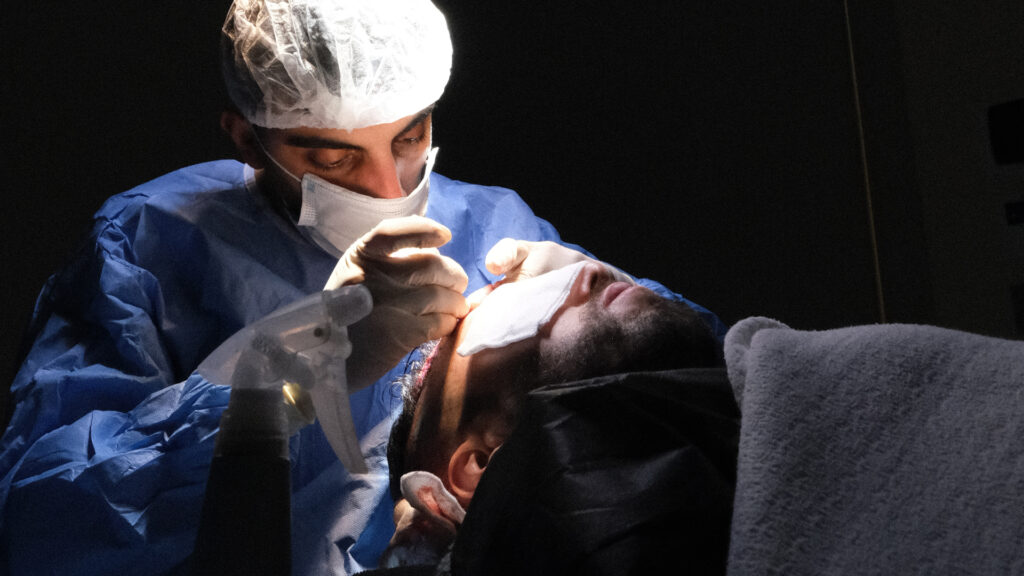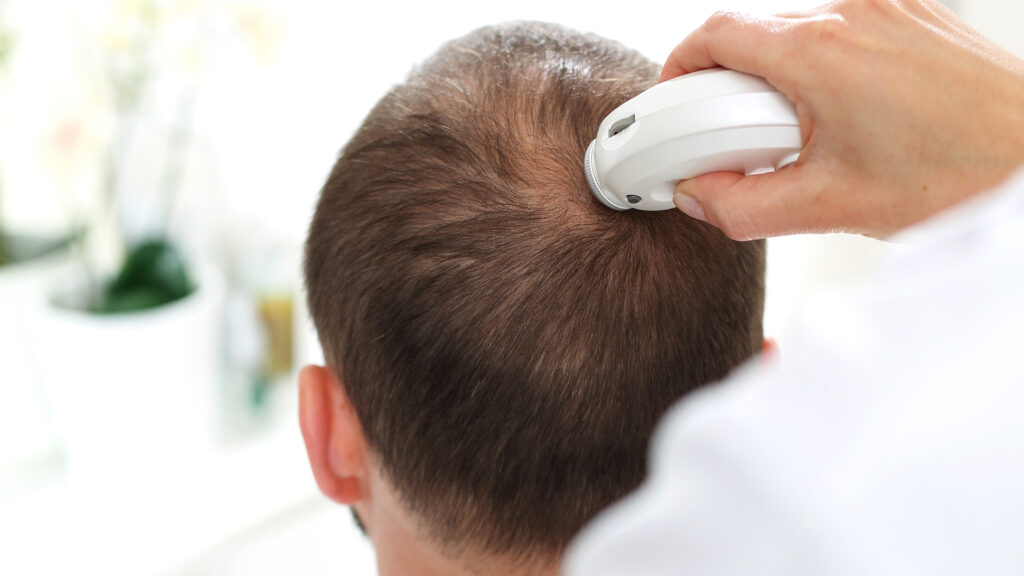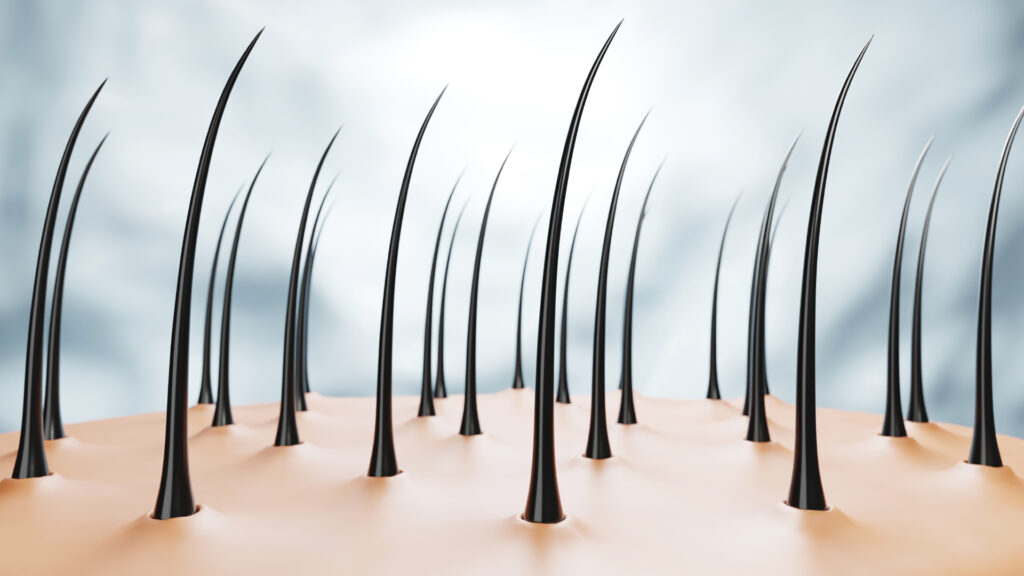A successful hair graft depends on the skill of the hair surgeon and the grafting technique adopted, the quality of the patient’s grafts and the success of the transfer of the follicles from the harvesting area to the grafting area. But recovery is just as important: the weeks following a hair transplant procedure are crucial for proper hair growth. Regardless of the hair transplant method you choose, the risk of a failed hair transplant is limited if you take good care of your new grafts. Your new grafts are fragile and require maximum attention to grow properly. To put all the chances on your side, it is fundamental to follow all the postoperative advice given by your clinic, and to motivate yourself with a good dose of personal will and patience. Whether it is for a male or female hair transplant, a beard transplant, a micro hair transplant on a limited area or a frizzy hair transplant, this guide to post-operative care for hair transplant in Turkey will allow you to offer your new hair, day after day, an optimized evolution.
What are the steps to follow after a hair transplant?
1st to 8th day
The day after the FUE hair transplant operation, after a good morning of rest, your last appointment at the hair clinic allows your surgeon to check the bulbs, and the caregiver to apply an antiseptic, such as red Betadine. The bandage is removed and a first shampoo is done at the clinic to teach the patient the proper procedure to follow. This is how the expert hair transplant clinic in Turkey, with which Body Expert works, proceeds. Take a full day of rest to get rid of the sedatives administered for the local anesthesia. If your professional activity is relatively sedentary, allow yourself two or three days of rest. If your job is more physical, a short week of rest is recommended. Do not drink a drop of alcohol for the next ten days, especially if your doctor has prescribed antibiotics. Do not smoke, at least for two to three weeks following the operation. Avoid salty and spicy foods.
Follow the medication prescriptions and post-hair transplant advice given by the clinic, while avoiding aspirin, which thins the blood and can hinder proper healing. Bandages should be removed by the end of the first day after the operation. If bleeding occurs, gently tap the area with a sterile gauze pad. However, an FUE hair transplant with PRP treatment reduces the risk of infection and optimizes regrowth.

After two days, you can begin to clean the skull, following precisely the instructions given by your doctor. Gently apply the product provided by your surgeon to the scalp, which both cleanses the skull and relieves itching. Rinse with clear warm water, using a cup in which you dip your fingers. Do not touch the scabs. Several times a day, you can spray the implanted area with a mister (Evian type mister). After four-five days, you can put your head under a warm shower with moderate pressure and use the special shampoo to clean the operated area, always very gently. After one week, shower the grafted area for about twenty minutes, always with lukewarm water. The scabs start to fall off. Do not scratch them.
Avoid any contact of the grafts with any other material. To sleep, adopt a semi-sitting position for the first two nights and use a special pillow to support your neck. This will prevent the forehead area from swelling and will avoid any contact of the recipient area with the sheets. The recipient area can be in contact with the pillow, but it is recommended to put an absorbent disposable diaper on it, in order to absorb the sebum oozing from the scars.
To prevent swelling of the epidermis above the eyebrows, which usually appears on the 3rd or 4th day after the operation, apply a washcloth filled with ice cubes to the forehead area. You can also wear a foam headband on the forehead to prevent the swelling from going down into the eyes.
Sexual activity is not allowed during the first 10-15 days to avoid an increase in the temperature of the cranial epidermis, which is harmful to the proper regrowth of the grafts.

Day 8 to 30
Once you have resumed your normal rhythm of life, the scabs begin to disappear under your daily shower. During the first month, all exposure to the sun is forbidden, as well as to the rain. Itching may occur during this period. Calendula oil and/or aloe vera, an anti-irritation product for babies’ skin, can be applied to the area. It helps the healing and hydration of the implanted area, preventing the skin of the scalp from becoming too dry.
All aggressive hair products, gels, lacquers, waxes or colorings are forbidden, as well as the use of combs or brushes. A successful hair transplant is also determined by a strict maintenance of the hair after the operation. Argan, sesame or coconut oil can help nourish the scalp, and mild shampoos made from natural ingredients are preferred. A healthy diet, rich in minerals and vitamins and low in fats, helps provide the hair implants with a well-oxygenated and nutritious blood supply. In case of mineral or vitamin deficiencies, you can ask your pharmacist for specific support for good hair growth, with a natural cocktail of probiotics, minerals and vitamins.
1st to 3rd month:
One month after the operation, the implanted follicles, like tiny fluff, begin to fall out. This is normal. They will then start to grow again, and your new permanent hair will appear after about three months. During this time, small white spots may appear before the hair arrives. This is a normal reaction to hair growth, not an infectious pimple. They will turn red and then open up on their own, making room for the new hair. In some cases, a sensation of numbness may take over the operated area. Don’t worry, this sensation will disappear at the end of the second month.
Let your head breathe in all circumstances, but do not expose it to the sun’s rays, which are fatal for the baby follicles and bad for the healing of the hair transplant. Motorcycle helmets, hats and other head coverings should be avoided for the first three months to avoid damaging the grafts and compromising their proper regrowth. Do not resume any sporting activity before three months, nor swim in the sea or pool.
The results of a hair transplant are really visible after eight to twelve months.
Frequently asked questions after a hair transplant

I have scabs after my hair transplant, is this normal ?
Yes, this is completely normal. From the first day, crusts of skin and blood clump together on the implanted grafts. Do not touch them. The application of foam and shampoo on a daily basis from the day after the transplant, and for 8 days, will help soften the crusts, as well as a warm shower with a moderate jet. All scabs will disappear after 8-10 days.
Read our complete article on scabs after hair transplant

Can I wear a cap, hat or helmet after a hair transplant?
It is recommended to let your head breathe as much as possible after the hair transplant. Some clinics recommend wearing and providing a headband, to prevent swelling down to the eyes, for four-five days after the operation. A wide bob or wide-tongued cap can be worn after one week. A woolen cap is allowed after a minimum of one month, as well as a construction, fireman’s or motorcycle helmet.

Can I apply castor oil to my grafts?
No, it is recommended not to apply anything to the grafted area during the first six months, whether it be castor oil, hair color, hair spray or gel. Only the hair cleaning products or natural creams (calendula, sesame or coconut oil based) prescribed by the clinic can be applied.

Is there a particular diet or food supplements recommended after a hair transplant?
In addition to the need to drink plenty of water regularly, it is recommended to adopt a healthy diet, low in sugar and fat, based on meat, vegetables and salads. Mineral packs (calcium, magnesium, zinc, iron, phosphorus, manganese, selenium, potassium…), and vitamins (biotin, saw palmetto, finasteride and CDE multivitamins), for the next six months, can help ensure good hair growth, to give it tone and vitality.

How long before resuming sports after a hair transplant?
Moderate sports such as cycling, yoga or running can be resumed one month after the hair transplant, but more violent sports requiring intense physical effort, such as team sports, squash or weight training, should not be resumed before three months, because of the high blood pressure they exert on the body, and particularly the head.

Why do I have to wear a headband after a hair transplant?
At the last appointment with your clinic, 24 hours after the transplantation and after the bandage has been removed, you will be recommended to wear a headband (usually provided), which prevents the swelling from the operation from falling back on the face and distorting the eyebrows, nose and eyes with a bluish hematoma.

Is it possible to have sex after a hair transplant?
No. Because of the blood pressure it causes in the skull and scalp, you should avoid all sexual activity for ten days following the hair transplant.

Can I expose myself to the sun or swim after my hair transplant?
Whether in the sea or in a swimming pool, it is forbidden to swim for at least one month after the hair transplant. Hammam, sauna, spa and any activity that causes abnormal heating of the epidermis should also be avoided, so as not to alter the grafts.

Can I shave my hair after a transplant?
You can shave the implanted grafts after 6 months of regrowth. Before this period, it is possible to trim your new hair with scissors. On the other hand, the donor area can be trimmed after 1 month, in order to better harmonize the level of regrowth on your entire head. However, it is not recommended not to shave your head during the first year. And then, what is the point of paying for a hair transplant, if it is to be shorn?

Will the implanted grafts fall back?
Between 2 and 8 weeks, the implanted grafts will gradually fall back. This is normal, as the first fluff gives way to the new rooted grafts, which will grow back from the 3rd or 4th month. However, it can happen that some patients – the lucky ones – see their grafts not fall back and go on to regrow their hair directly. However, this only happens in 5% of cases.
68501 vues
20 commentaires
8






20 Commentaire(s)
Hi There,
Firstly I would like to thank you a lot for such a crucial information about hair transplanting.
Secondly I want to know what kind of shampoo should be used for transplanted hair?
Thank you a lot
Hello and nice to meet you ????
Thank you for your interest in our articles and sorry for the late reply.
For the maintenance of implanted hair please use a paraben free, fragrance free, oil free, neutral or very low ph shamppo.
A nice day to you from the Bodyexpert.online team
Hi, When is it safe to go out in rainfall for prolonged period of time, say 2-3 hours?
Hello and nice to meet you ????
From the 7th day you can put on a cap and use an umbrella of course.
You really need to protect yourself as much as possible the first month of the rain.
And if you absolutely have to go out in the rain before these 7 days you have to wear a large bob or a large hat that does not touch the grafts.
Have a nice day from the bodyexpert.online team
na haartransplantatie met organolie op hoofd masseren en hoeveel keer per week en na hoeveel maanden of weeken?
Is dit goed voor meer haar groei?
Hallo en leuk je te ontmoeten ????
Het wordt aanbevolen om de eerste zes maanden niets op het geënte gebied aan te brengen. Alleen de door de kliniek voorgeschreven haarreinigingsproducten of natuurlijke crèmes kunnen worden toegepast.
Arganolie zal interessant zijn na de hergroei, om het haar te beschermen tegen externe agressies zoals vervuiling, zonnestralen of wind. Het geeft kracht en glans aan het haar en versterkt de hoofdhuid.
Fijne dag voor u van het bodyexpert.online team
Hi, This post is really informative. I had a transplant this year on March 20th. After 10 days post HT, My clinic gave me two serums (Biotin & Anagain) one for morning and one for night. I am using it since April. Recently I came to know it’s not recommended to use anything other than supplements in the first 6 months. I am worried now that I might have damaged the transplanted hairs by using these serums.
Could you please elaborate why such products aren’t recommended to use?
And if used, how to know it’s damaged the hair follicles?
Hello and nice to meet you ???? unfortunately we can’t answer your questions, as we don’t know your medical file, nor the clinic that performed your hair transplant.
Normally they should provide you with a rigorous post operative follow-up as we do for our patients. Please contact them so that they can answer you and bring you the necessary information to justify their medication protocol.
Good day to you from bodyexpert.online
I really needed to read this. Thanks for sharing.
Shreya
Hello ????
We are happy that our articles provide you with the information you need.
Do not hesitate to consult us by clicking on this link:
https://www.bodyexpert.online/en/call-back
On behalf of the bodyexpert.online team, we wish you a wonderful day!
Thanks for sharing this beautiful articleI, Can i Remove Headband after 3 days if there is no edema.
Secondary Can I use water to the graft side after 1 day Surgery
Third
Can I sleep fallback rountinle of may cause hematoma to the face
Hello and nice to meet you ????
Your headband should be removed on day 3.
Your first shampoo should be performed the day after surgery, following your surgeon’s instructions.
The sleeping position must be strictly observed to avoid edema.
Please follow the instructions given by your surgeon, who will provide you with all the information you need for your post-operative care.
On behalf of the bodyexpert.online team, we wish you a very pleasant day.
Hi BodyExpert,
I have taken HT FUE 10 Days back, Last day I had wash and clot removal in the implanted area & Donor area. But Now I have mild headache in the implanted area, How long does it last and Can I use multivitamin or biotin with DHT blocker cap for next 6 months. Whether DHT blocker affects any specific for long duration usage. How many PRP’s are required after HT and time difference b/w each PRP.
Thanks
Hello and nice to meet you. Unfortunately, without precise knowledge of your health file, we cannot, for ethical reasons, substitute ourselves for your surgeon. Please ask your questions to the clinic that operated on you. They must provide you with a postoperative service. On behalf of the bodyexpert.online team, we wish you a very pleasant day.
Thank you for sharing this informative post. It will be really helpful for me.
Thank you from the bodyexpert.online team
Thank you for your valuable information
Thank you from the bodyexpert.online team
Hi i am 6 months now into the hair tranplsnt and have not seen much growth (only about 10%) and now the docter is telling me to do prp and mesiotharapy. Is there a chance after i go these steps that the hair transplant will be succsesful or is it too late.
Hello and nice to meet you. We don’t have access to your complete medical file and the photos of each stage (month by month), so we can’t give an objective opinion.
The clinic that operated on you should provide you with the necessary advice and follow-up.
In 6 months’ time, if your hair transplant has not achieved the desired result, we invite you to contact our teams.
We’ll do a pre-study with our specialists, based on the additional information you’ll be asked to provide.
Simply fill in the following form https://www.bodyexpert.online/en/call-back
One of our customer assistants will contact you directly via Whatsapp (free application).
Have a nice day, from the Bodyexpert.online team.